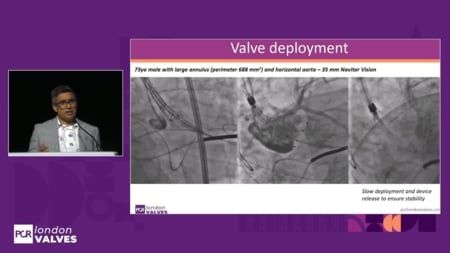30 Sep 2025
Complex femoral access for TAVI in bicuspid aortic stenosis - LIVE Case
Summary
A 74-year-old male with a history of multiple PCIs, peripheral arterial disease, and type 2 DM presented with symptomatic bicuspid aortic stenosis and preserved LV function.
A 26 mm Myval valve was implanted via right femoral artery access, with right radial secondary access, following predilatation with a 20 mm balloon. The femoral access was prepared using a 7 mm Shockwave balloon.
Closure was achieved with two ProGlide devices, and a non–flow-limiting iliac dissection was left in place.
LIVE Educational Case from Chest Diseases Hospital - Kuwait City, Kuwait
Navigate the video by moving your mouse over the chapter icon in the toolbar

Key moments
- 05:38–12:12 – Imaging analysis
- 19:53–23:27 – Femoral access with shockwave
- 36:10–44:00 – Final scopy, echo, and hemodynamic results
- 49:03–01:05:05 – Closure access with 2 ProGlides
Keywords: Bicuspid aortic stenosis, Myval, vascular closure, shockwave in arterial access
Learning Objectives
- To learn the approach to a TAVI with difficult femoral access
- To learn the unique challenges of bicuspid valve anatomy
- To learn decision-making skills regarding device selection, sizing and implantation techniques in bicuspid anatomy




